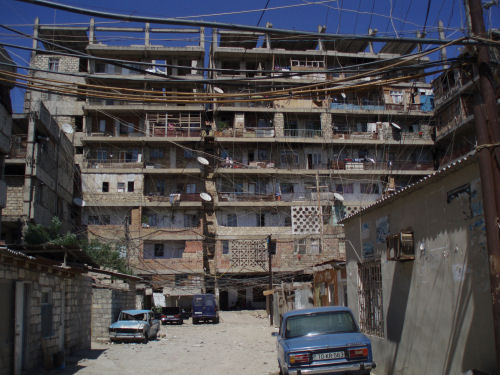
Yesterday was a rather typical day for me in Azerbaijan’s capital, Baku. I left my host family’s nice home and walked fifteen minutes to the nearest metro station. On the way to the metro station I passed new apartment buildings, food shops with locally-grown fruit displays, clothing stores with bright skirts hanging in the windows, street cats lolling in the sun, bored taxi drivers playing backgammon, and street vendors selling cell phone cards. I weaved through and dodged traffic when necessary, Frogger-style. $0.05, three metro stops, and three flights of stairs later, I arrived at the NorMicro head office. The head office oversees five branch offices (Baku, Sumgayit, Khachmaz, Agsu, Beylagan) that provide loans to IDPs and low-income Azerbaijanis.
I took advantage of the relatively consistent electricity and dial-up internet access that the Baku head office offers, and reviewed the Kiva.org profiles of the clients I planned to visit later in the day. Yesterday was really warm, so I opted to not have the obligatory morning cup of hot chay. I emailed two of the five NorMicro branch representatives that deal with Kiva clients and arranged visits with them for next week. When lunchtime rolled around, rather than eat the office cook’s freshly prepared meal (like I usually do – and with enjoyment!), I instead met a friend (and Kiva lender!) at an air-conditioned café on a shaded pedestrian street near the beautiful Baku Opera Theater. After a Western meal that cost more than I usually spend in an entire week, I hurried to meet up with two of the Baku branch office’s loan officers.
The loan officers and I took the company Lada , a Russian car that is now ubiquitously Azerbaijani, and innocuously slipped out of shiny-happy Baku and into her darker, forgotten side. The contrast between the growing affluent population of Baku and the limbo-stranded IDP population still unnerves me, even after seeing it routinely for over a month. Our Lada passed new three-story homes carefully concealed behind foreboding walls with impressive metal gates and turned onto a rough, unpaved road leading to a neighborhood that may as well have been in another country. It is inconceivable that I ate an expensive lunch next to a beautiful Opera House less than five kilometers from this neighborhood. Sadly, neighborhoods like this exist all over Baku and many other parts of the country, as IDPs have been temporarily settled in old government buildings until they can return to their homes in Nagorno-Karabakh.
The dusty, rocky road was lined with mismatched sheets of scavenged metal that hid the living quarters beyond. We passed a group of rickety, wooden outhouses, all padlocked so that only the owners could use them. Children obliviously darted across the road and elderly men loitered in side streets, whiling away another day. Soon, we arrived at our destination: a row of little shops, haphazardly constructed along the edge of the road to serve this IDP community. Casting ragged shadows over the shops were three decaying, seven-story buildings that would have been condemned and then demolished anywhere else. Electric wires created a twisting and ominous web between the structures. Inside the buildings, worn wooden planks or old car doors bridged growing gaps in heavily-trafficked stairwells. Clotheslines hung in the hallways and trash filled empty cavities where elevators previously resided.
Over the course of two hours, I met with eight NorMicro entrepreneurs with loans financed by Kiva lenders. They came originally from districts that border the highly contested region of Nagorno-Karabakh: Fizuli, Jabrayil, Agdam. I was impressed by the sense of pride and foresight each of these lenders have in their businesses, despite the fact that for fourteen years they have been living in neglected, isolated communities with few economic opportunities. Each of them commented on the fact that the only way they are able to improve their businesses is through the microloans offered by NorMicro. They described to me their hopes for their families and business, but admitted that these hopes were going to be very difficult to achieve.
After leaving the IDP community, I spent a little while back at the head office collecting my thoughts and making notes for the journals I will later write on these entrepreneurs. Returning home with my host family, I spent some time “paying the rent” by speaking English with the three teenage kids. Later in the evening we ate corn-on-the-cob and watermelon in a yard surrounded by a high wall and metal gate – a world away from the IDP entrepreneurs I had met earlier.
/>

















